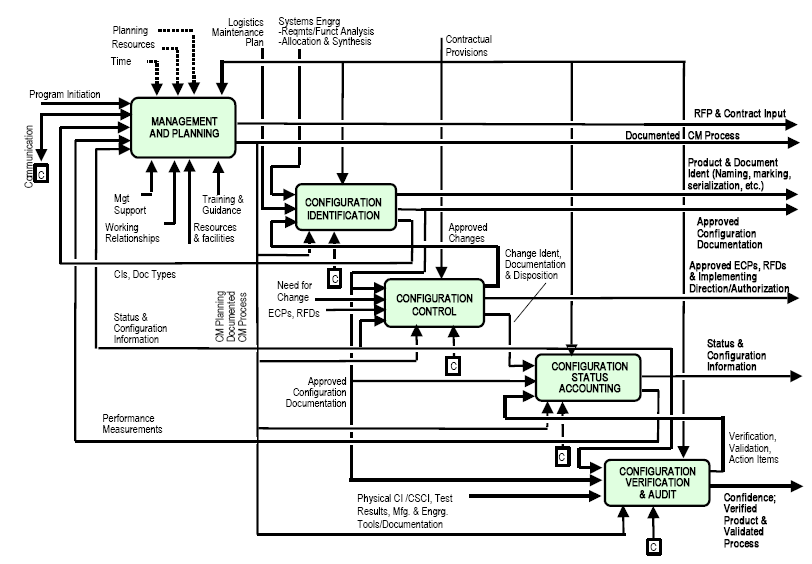|
Audit (other)
An audit is an independent evaluation of an organization, process, project, product or system. Audit, auditor or auditing may also refer to: Types of audit *Academic audit, the completion of a course of study for which no assessment is completed or grade awarded *Conformity assessment audit (ISO, HACCP, JCAHCO) *Environmental audit *Energy audit *First Amendment audits, social movement involving photographing or filming from a public space *Financial audit, the examination by an independent third party of the financial statements of a company *Clinical audit, a process of the United Kingdom's National Health Service *Internal audit *Performance audit, an examination of a program, function, operation or the management systems and procedures of a governmental or non-profit entity *Quality audit, a systematic, independent examination of a quality system *Helpdesk and incident reporting auditing Computing *Audit (telecommunication) - multiple meanings *audit trail *Information techn ... [...More Info...] [...Related Items...] OR: [Wikipedia] [Google] [Baidu] |
Audit
An audit is an "independent examination of financial information of any entity, whether profit oriented or not, irrespective of its size or legal form when such an examination is conducted with a view to express an opinion thereon.” Auditing also attempts to ensure that the books of accounts are properly maintained by the concern as required by law. Auditors consider the propositions before them, obtain evidence, and evaluate the propositions in their auditing report. Audits provide third-party assurance to various stakeholder (corporate), stakeholders that the subject matter is free from Materiality (auditing) , material misstatement. The term is most frequently applied to audits of the financial information relating to a legal person. Other commonly audited areas include: secretarial and compliance, internal controls, quality management, project management, water management, and energy conservation. As a result of an audit, stakeholders may evaluate and improve the effecti ... [...More Info...] [...Related Items...] OR: [Wikipedia] [Google] [Baidu] |
Audit (telecommunication)
In telecommunications, an audit is one of: * The act of conducting a review, examination and reconciliation of Telecom, Wireless and Network customer service records, invoicing and contract agreements in order to ensure the accuracy of budgetary forecasting. * Independent review and examination of records and activities to assess the adequacy of system controls, to ensure compliance with established policies and operational procedures, and to recommend necessary changes in controls, policies, or procedures. * Analysis of invoices, lines, rates, tariffs, taxes, plans, usage, call volume, systems, and contracts resulting in cost reduction, proper invoicing and optimization of telecommunication systems often conducted by an independent telecommunications consultant or firm. The simplest audits consist of comparing current telecommunications billing and usage to the underlying rate structure whether that is dictated by contract, tariff, or price list. Complex audits utilize software a ... [...More Info...] [...Related Items...] OR: [Wikipedia] [Google] [Baidu] |
Student Society
A student society, student association, university society, student club, university club, or student organization is a society or an organization, operated by students at a university or a college institution, whose membership typically consists only of students and/or alumni. Early notable types of student societies include the medieval so-called nations of the University of Bologna and the University of Paris. Later Modern era examples include the Studentenverbindung in the German speaking world, as well as the evolvement of fraternal orders for students and Greek-letter student fraternities and sororities internationally. Aims may involve practice and propagation of a certain professional hobby or to promote professional development or philanthropic causes. Examples of common societies found in most universities are a debate society, an international student society, a rock society, and student chapters of professional societies (e.g. the American Chemical Society). Not ... [...More Info...] [...Related Items...] OR: [Wikipedia] [Google] [Baidu] |
Saint Auditor
Saint Nectarius of Auvergne (also known as ''Nectarius of St-Nectaire, Nectarius of Limagne, Necterius of Senneterre'') (french: Nectaire) is venerated as a 4th-century martyr and Christian missionary. Life According to Gregory of Tours, Nectarius was one of the seven missionaries sent by Pope Fabian from Rome to Gaul to spread Christianity there. The other six were Gatianus of Tours, Trophimus of Arles, Paul of Narbonne, Martial of Limoges, Denis of Paris, and Saturninus of Toulouse. Nectarius was accompanied by the priests Baudimius (Baudenius, Baudime) and Auditor (Auditeur); tradition states that they were all brothers. An alternate tradition states that Saint Peter rather than Pope Fabian sent Nectarius and his brothers to evangelize Gaul. A third tradition states that Saint Austremonius ordered Nectarius to Christianize the plain of Limagne in the Massif Central. Nectarius turned a temple dedicated to Apollo on the hill known as Cornadore into a Christian church, ... [...More Info...] [...Related Items...] OR: [Wikipedia] [Google] [Baidu] |
Auditing (Scientology)
In Dianetics and Scientology, auditing is a process whereby the "auditor" takes an individual through times in their current or past lives with the ostensible purpose of ridding the individual of negative influences from past events or behaviors. Auditing is meant to bring the individual to " Clear" status; thus, an individual being audited is known as a "preclear" or PC. Auditing was invented by L. Ron Hubbard as an integral part of Dianetics, first introduced in 1950. In 1951, auditing also became a core practice of Scientology. The E-meter, a device to measure electrodermal activity, became an integral part of auditing in scientology. According to the Church of Scientology, "one formal definition of auditing is the action of asking a person a question (which he can understand and answer), getting an answer to that question and acknowledging him or her for that answer". Hubbard claimed auditing provided many benefits including unsupported medical and psychological health effects ... [...More Info...] [...Related Items...] OR: [Wikipedia] [Google] [Baidu] |
BackTrack
BackTrack was a Linux distribution that focused on security, based on the Knoppix Linux distribution aimed at digital forensics and penetration testing use. In March 2013, the Offensive Security team rebuilt BackTrack around the Debian distribution and released it under the name Kali Linux. History The BackTrack distribution originated from the merger of two formerly competing distributions which focused on penetration testing: * ''WHAX'': a Slax-based Linux distribution developed by Mati Aharoni, a security consultant. Earlier versions of WHAX were called ''Whoppix'' and were based on Knoppix. * ''Auditor Security Collection'': a Live CD based on Knoppix developed by ''Max Moser'' which included over 300 tools organized in a user-friendly hierarchy. On January 9, 2010, BackTrack 4 improved hardware support, and added official FluxBox support. The overlap with Auditor and WHAX in purpose and in collection of tools partly led to the merger. The overlap was done based on Ubuntu ... [...More Info...] [...Related Items...] OR: [Wikipedia] [Google] [Baidu] |
Linux
Linux ( or ) is a family of open-source Unix-like operating systems based on the Linux kernel, an operating system kernel first released on September 17, 1991, by Linus Torvalds. Linux is typically packaged as a Linux distribution, which includes the kernel and supporting system software and libraries, many of which are provided by the GNU Project. Many Linux distributions use the word "Linux" in their name, but the Free Software Foundation uses the name "GNU/Linux" to emphasize the importance of GNU software, causing some controversy. Popular Linux distributions include Debian, Fedora Linux, and Ubuntu, the latter of which itself consists of many different distributions and modifications, including Lubuntu and Xubuntu. Commercial distributions include Red Hat Enterprise Linux and SUSE Linux Enterprise. Desktop Linux distributions include a windowing system such as X11 or Wayland, and a desktop environment such as GNOME or KDE Plasma. Distributions intended for ser ... [...More Info...] [...Related Items...] OR: [Wikipedia] [Google] [Baidu] |
Software Audit (other)
{{disambig ...
Software audit may refer to: * Software licensing audit, where a user of software is audited for license compliance * Software quality assurance, where a piece of software is audited for quality * Software audit review, where a group of people external to a software development organisation examines a software product * Physical configuration audit * Functional configuration audit Functional may refer to: * Movements in architecture: ** Functionalism (architecture) ** Form follows function * Functional group, combination of atoms within molecules * Medical conditions without currently visible organic basis: ** Functional s ... [...More Info...] [...Related Items...] OR: [Wikipedia] [Google] [Baidu] |
Information Technology Audit
An information technology audit, or information systems audit, is an examination of the management controls within an Information technology (IT) infrastructure and business applications. The evaluation of evidence obtained determines if the information systems are safeguarding assets, maintaining data integrity, and operating effectively to achieve the organization's goals or objectives. These reviews may be performed in conjunction with a financial statement audit, internal audit, or other form of attestation engagement. IT audits are also known as automated data processing audits (ADP audits) and computer audits. They were formerly called electronic data processing audits (EDP audits). Purpose An IT audit is different from a financial statement audit. While a financial audit's purpose is to evaluate whether the financial statements present fairly, in all material respects, an entity's financial position, results of operations, and cash flows in conformity to standard acco ... [...More Info...] [...Related Items...] OR: [Wikipedia] [Google] [Baidu] |
Configuration Management
Configuration management (CM) is a process for establishing and maintaining consistency of a product's performance, functional, and physical attributes with its requirements, design, and operational information throughout its life. The CM process is widely used by military engineering organizations to manage changes throughout the system lifecycle of complex systems, such as weapon systems, military vehicles, and information systems. Outside the military, the CM process is also used with IT service management as defined by ITIL, and with other domain models in the civil engineering and other industrial engineering segments such as roads, bridges, canals, dams, and buildings. Introduction CM applied over the life cycle of a system provides visibility and control of its performance, functional, and physical attributes. CM verifies that a system performs as intended, and is identified and documented in sufficient detail to support its projected life cycle. The CM process facilita ... [...More Info...] [...Related Items...] OR: [Wikipedia] [Google] [Baidu] |
Configuration Audit
Configuration or configurations may refer to: Computing * Computer configuration or system configuration * Configuration file, a software file used to configure the initial settings for a computer program * Configurator, also known as choice board, design system, or co-design platform, used in product design to capture customers' specifications * Configure script ("./configure" in Unix), the output of Autotools; used to detect system configuration * CONFIG.SYS, the primary configuration file for DOS and OS/2 operating systems Mathematics * Configuration (geometry), a finite set of points and lines with certain properties * Configuration (polytope), special kind of configuration for regular polytopes * Configuration space (mathematics), a space representing assignments of points to non-overlapping positions on a topological space Physics * Configuration space (physics), in classical mechanics, the vector space formed by the parameters of a system * Electron configuration, t ... [...More Info...] [...Related Items...] OR: [Wikipedia] [Google] [Baidu] |
Information Technology Security Audit
An information security audit is an audit on the level of information security in an organization. It is an independent review and examination of system records, activities and related documents. These audits are intended to improve the level of information security, avoid improper information security designs, and optimize the efficiency of the security safeguards and security processes. Within the broad scope of auditing information security there are multiple types of audits, multiple objectives for different audits, etc. Most commonly the controls being audited can be categorized to technical, physical and administrative. Auditing information security covers topics from auditing the physical security of data centers to auditing the logical security of databases, and highlights key components to look for and different methods for auditing these areas. When centered on the Information technology (IT) aspects of information security, it can be seen as a part of an information tech ... [...More Info...] [...Related Items...] OR: [Wikipedia] [Google] [Baidu] |



.jpg)
